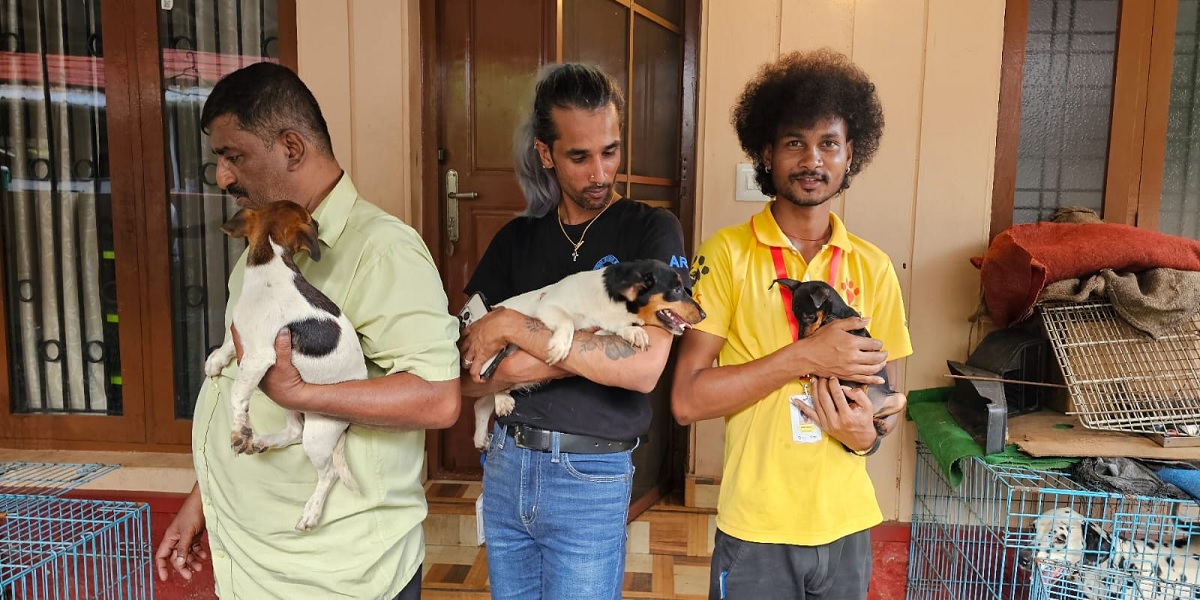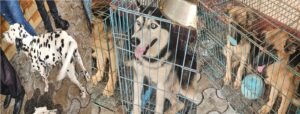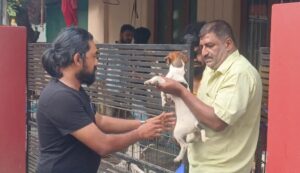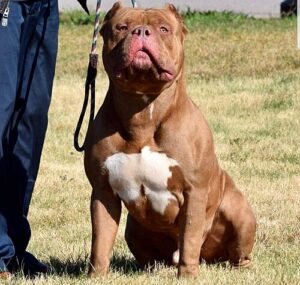Published Aug 29, 2025 | 8:03 PM ⚊ Updated Aug 29, 2025 | 8:52 PM

The abandoned dogs were rescued by TK Sajeev, Secretary of the SPCA in Ernakulam district, along with his team.
Synopsis: An incident of a man abandoning his eight-year-old son and 26 dogs at their rented home in Kochi has exposed the underbelly of pet trade in Kerala, where greed overshadows professionalism and compassion.
Police had a tough time getting the eight-year-old boy out of his house at Tripunithura in Kochi late on 24 August.
The police were at the house after receiving a call from the boy’s Germany-based mother, who said her husband had fled, leaving the child and about 26 high-breed dogs.
When the police arrived, the dogs, though famished, were in protective mode. They did not allow anyone to enter the premises, possibly fearing harm to their little master. They barked, some whined, many growled, and a few others just looked on.
The police summoned the boy outside, fed him, and took him to the Hill Palace Police Station. A couple of hours later, his maternal grandparents took him to their residence.
The dogs, almost all were foreign breeds, meanwhile, got restless. Separation anxiety might have kicked in.
Two days later, the neighbours heard the distressed whines and howls and contacted the Society for the Prevention of Cruelty to Animals (SPCA) through the ward councillor, PB Satheesan. Soon, SPCA volunteers reached the house.

Dalmatians, Siberian Huskies, and GSDs, along with many other foreign breeds, were found abandoned in the Kochi house.
”When our team reached there, the condition of the dogs was terrible. Some were pregnant, many were weak and hungry, and all were barking aggressively due to lack of food and water,” TK Sajeev, Secretary of SPCA – Ernakulam, told South First.
The dogs were not the only aggressive lot. The residents’ association objected to feeding them.
“When we tried to feed them, the residents’ association objected, saying it would be better if the dogs died since they were a nuisance. Our team still provided food and shifted them to a shelter,” Sajeev said.
The SPCA has plans to lodge a complaint under Section 325 of the BNS, which covers cruelty to animals, including killing, poisoning, or maiming. “Their intention was to let the dogs die,” he added.
Incidentally, the hapless canines were shifted on 26 August, the International Dog Day. Kochi celebrated the day along with the rest of the world. Special events — and offers — were organised at pet shops, and invitations were sent out to dog parents, who regularly visited their establishments.
The Tripunithura incident, however, reflected the underbelly of the pet trade. The breeder, overwhelmed by the number of dogs under his charge, left them at the rented accommodation on Ayyamballichira Road and fled. His son was also left behind.
Residents had earlier complained to the municipality about the nuisance and suspected illegal breeding on the premises. A notice was issued to both the tenant and the house owner. Authorities confirmed that further legal action will be taken against the man, identified as Sudheesh S Kumar, for abandoning the animals.
Sajeev said only foreign breeds were found at the house, each valued between ₹30,000 and ₹50,000. The breeds included Dalmatian, Dachshund, Beagle, Siberian Husky, German Shepherd, Miniature Spitz, and Golden Retriever.

SPCA volunteers shifting the dogs on Tuesday.
”Sudheesh was an illegal breeder, operating purely for profit. He bred and sold dogs commercially, but when he faced difficulty selling puppies, it led to financial pressure. This, along with complaints from neighbours, forced him to abandon his son and 26 dogs,” the SPCA office-bearer said.
He added that illegal breeding has become a growing problem.
Kochi alone has around 25 dog clinics, along with numerous grooming and pet supply centers. However, exotic breeds are frequently found abandoned on the streets.
Sajeev claimed that Sudheesh did not have a dog ownership or breeding licence, pointing to ineffective enforcement by local authorities.
”Legal breeders use microchips to track ownership and ensure responsibility. Illegal breeders have no such accountability. The minimum breeding fee is ₹10,000, but many illegal breeders force female dogs to mate even when they are not in heat. This is cruelty,” he said.
Sajeev further explained that in kennel shows, champion dogs increase the demand for their puppies, leading breeders to engage in mass breeding, crossbreeding, and, eventually, abandonment.
Breeds like Labrador Retrievers are commonly abandoned. SPCA rescues at least one Labrador a day in Kochi.
Dr. Sunil Kumar of the Felican Pet Hospital in Kochi spoke about the trends in dog breeding and the challenges facing popular breeds in Kerala.

Dr Sunil Kumar said and it’s high time that Pug breeding is banned in India.
“The most popular dog breeds in Kerala are Labrador, German Shepherd, Doberman, and Indian Spitz. But nowadays, newer breeds like Shih Tzu, Poodle, and others are also gaining popularity.”
”The problem is that their germplasm is very limited. If breeding is not carefully managed, it can lead to inbreeding,” he said. “Kennel clubs issue certificates only after verifying at least 3–5 generations of a dog. When breeding, it is crucial to check these certificates to ensure no blood relation. Otherwise, the germplasm gets diluted, resulting in genetic disorders and other health issues,” the vet said.
”Twenty years ago, Labradors were clean, healthy family breeds. Now, they suffer from many diseases due to inbreeding,” Dr. Sunil noted.
He spoke about man-made errors in breeding.
”Take the Pug, for example. Eighty out of 100 Pugs that come to our clinic suffer from eye diseases, chest infections, and genetic disorders like corneal ulcers. If a genetic disorder is detected, responsible breeders stop breeding that line. But illegal breeders continue it for profit, causing suffering for the puppies. The Pug is the worst affected, and it’s high time that India banned Pug breeding,” he opined.
Dr. Kumar also mentioned other genetic issues. ”Monorchid, cryptorchid, and some skin diseases are hereditary. Selective breeding is critical. Even a dog’s temperament is influenced by breeding. Breeding two aggressive dogs will likely produce aggressive puppies, which affects the entire germplasm.”
Beagle, Poodle, and Shih Tzu breeds in Kerala are going through a tough phase. Their high market demand has led to widespread illegal breeding, resulting in health problems like canine atopy, eye diseases, and more.
Another significant issue the doctor spoke about was the rise of puppy mills.

Some youngsters demand ‘ferocious’ dogs inspired by video games, which promote aggressive behaviour.
”A puppy mill is an establishment that breeds puppies for sale, typically in inhumane conditions. During the COVID-19 period, the demand for puppies skyrocketed, and many breeders ran puppy mills to meet this demand. After the pandemic, many of these dogs were abandoned on the streets.”
Sadly, the same puppies that gave company to their parents during the lockdown ended up helpless on the roads. Some waited at the same spot where they were left, looking with expectation at each passing car, in the belief that their owner would come to pick them up.
”The Indian government has strict guidelines for dog breeding, but in Kerala, they are largely ignored. Illegal breeding is rampant. Responsible ownership is almost nonexistent. Ideally, each dog should have a 15-year liability because each breed has unique needs and requires special care,” Dr Kumar said.
He recommended selective breeding. “In foreign countries, if a dog is found to be aggressive, it is not allowed to breed; this practice helps prevent passing on undesirable traits.”
A dog’s temperament is influenced by its breeding. Mating two aggressive dogs can produce aggressive offspring and even affect the quality of the germplasm. But in Kerala, some youngsters demand ‘ferocious’ dogs inspired by video games, which promote aggressive behaviour.
”If we advise breeders, many don’t listen. They lack scientific knowledge. Little knowledge in dog breeding is very dangerous.” Dr. Kumar warned.
Dr. RS Bimal, Additional Private Secretary to Animal Husbandry Minister J. Chinchurani, highlighted another major challenge in animal welfare enforcement in Kerala. The State Animal Welfare Board (SAWB) is not a statutory body and hence lacks statutory powers.
”Legal enforcement faces many limitations without statutory authority. Once the SAWB is granted such powers, implementing laws will become much easier,” he told South First.
Dr. Bimal added that a meeting is scheduled for the third week of September to discuss issues such as dog breeding regulations and mandatory licensing for both breeders and pet owners.
”Licensing will encourage responsible pet ownership, support Animal Birth Control (ABC) initiatives, ensure timely vaccinations, and help track animals. We are also planning a dedicated animal welfare website. Strict measures will be implemented soon,” he said.
Three months ago, Kerala proposed mandatory sterilisation and microchipping for all pet dogs to control the stray population. The plan also included licences for dog breeding centres, penalties for unlicensed operations, and microchips to track pets and owners.
(Edited by Majnu Babu).

